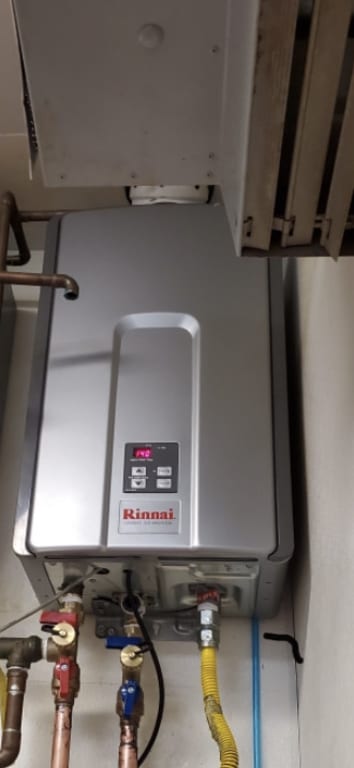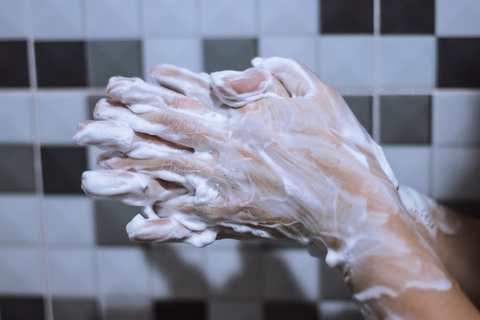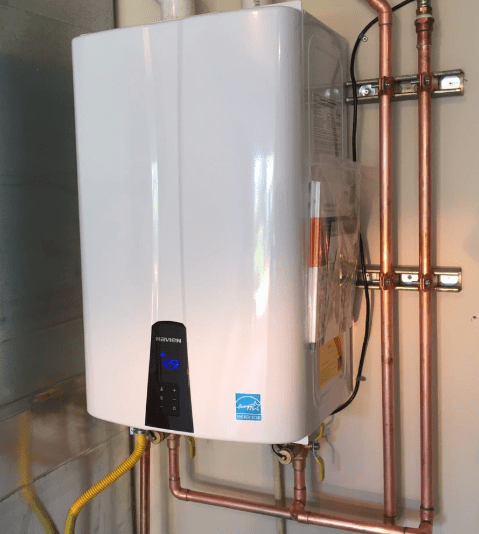What Size Tankless Water Heater Do I Need? [Cape May, Atlantic County, NJ

Unlike conventional units, you don’t need to measure the number of gallons a tankless water heater needs. Instead, you need to consider how much hotter you need to make your water, and how much you may need at once.
In this article, we’ll walk you through everything you need to know about the specs for a tankless water heater. This way, you have an idea of what you’ll need for your home. Then, you can focus on the best options for you and your home.
We’ll start with a quick overview of how these appliances work. Then, we’ll see what you need to know specifically for South Jersey homes.
How Tankless Water Heaters Work

It’s a very different model from traditional water heaters. The ones you’re likely used to are the big drums that sit in the basement or a closet. Each one stores dozens of gallons of water at once.
That way, you always have an ample supply of hot water ready to go for whatever you need. The drum fills back up as you use the water, and it keeps it all warm for you, all the time.
If you’re already considering the model that’s right for you, you will likely already know about the advantages of going tankless. But, we’ll go over a few of them at the end of this article.
Let’s look at the two most significant factors that determine what your home needs: The average water temperature in Cape May, Atlantic County, or anywhere else in South Jersey. Then, how many faucets and appliances you have.
Heating Water in South Jersey
A tankless water heater must be able to instantly heat water as it passes through. So, you need one appropriate for the average ambient temperature of the water in your part of the country.
And you also have to consider how hot you need it to get.
Hot Water for Showering and Hand-washing

Perhaps surprisingly, the water temperature doesn’t matter much when it comes to washing your hands to stay germ or virus-free.
You can go up to around 100 degrees, but you’ll get the same effect as with 60-degree water. As long as it’s warm, you’re fine.
What matters more is using soap and lathering for more than five seconds — around 20 seconds to be on the safe side.
Water Temperature for Appliances
Dishwashers and washing machines set to “Hot” need the water at 110 or 115 degrees Fahrenheit. If you’re washing dishes by hand, the water needs to be that hot as well.
Of course, you’re probably not all that scientific in your day-to-day life. You know how by feel hot is too hot for your shower, and the water heater has settings to make sure your appliances are good to go.
But, for tankless, you have to determine how much you need to warm up the water. 
Temperature Rise for South Jersey Water
As anyone who’s jumped in the ocean after Labor Day (or before Memorial Day) knows, the average water temperature in Ocean City, Avalon, or anywhere else near the shore doesn’t stay the same all year.
Water on the coast gets as cold as 37 degrees, and up to 75 degrees in August. The water your heater would draw from through the pipes shouldn’t ever go below 50 degrees.
What that means for a tankless unit is that you should subtract the coldest the water could be coming into your South Jersey home (50 degrees) from the hottest you’d want it (115 degrees).
So, any model that can raise the temperature of 65 degrees is good.
Flow Rates and Gallons Per Minute
You don’t have to worry about storing water with these heaters — just how many gallons of hot water you can get every minute. You’ll calculate that based oh how much you might need at once.
Tankless is popular down the shore because you won’t run out of hot water when a small army comes home from the beach and showers one after the other — sometimes more than one at the same time if you have outdoor showers.
Outside of beach season, plenty of people have more than one bathroom or may want to say, shower, and run the dishwasher at the same time.

- 3 GPM for a shower;
- 4 GPM for a bathtub;
- 1.5 GPM for dishwashers and kitchen sinks;
- 2 GPM for washing machines.
Note that some showers use a little less, but you may as well round up.
At any rate: Add up how many of these you might use at once. Then, look for models that can give you that many gallons of hot water per minute.
You may not find one that’s strong enough. We see this sometimes with larger luxury homes, and especially duplexes with outdoor showers.
That’s fine, too. You can install two so that one never gets overworked. For the average one-family home, however, this isn’t a problem.
Tankless Water Heater Installations in Cape May and Atlantic Counties

Of course, it’s a good idea to have a professional run the numbers with you, too! Starting with an in-person or video conference, we’ll assess your home’s needs and help you find the perfect model for you!


